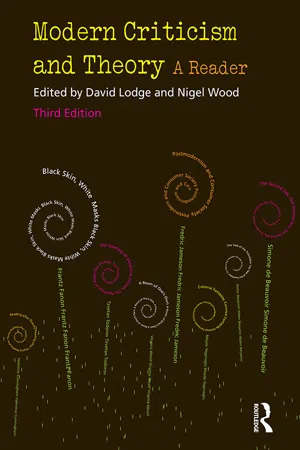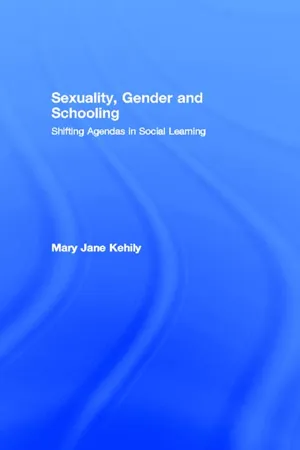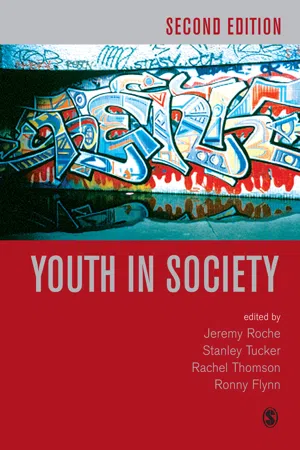Social Sciences
Jeffrey Weeks
Jeffrey Weeks is a prominent sociologist known for his work on sexuality and gender. He has made significant contributions to the study of sexual politics, queer theory, and the social construction of sexuality. Weeks' research has had a profound impact on understanding the complexities of sexual identity and the ways in which it intersects with broader social structures.
Written by Perlego with AI-assistance
Related key terms
1 of 5
3 Key excerpts on "Jeffrey Weeks"
- eBook - ePub
Modern Criticism and Theory
A Reader
- Nigel Wood, David Lodge(Authors)
- 2014(Publication Date)
- Routledge(Publisher)
40 Jeffrey Weeks
DOI: 10.4324/9781315835488-40Jeffrey Weeks (1945– ) is the Executive Dean of Arts and Human Sciences at the South Bank University in London. Since 2005, he has been the Director of the Social Policy and Urban Regeneration Research Institute. A historian and sociologist, specializing in accounts of sexuality and its changing contexts, he has provided several carefully researched studies of gender behaviour, especially the social organization of intimate life, including gay and lesbian sexuality. This focus has helped re-define social policy in Britain and extended equal rights to minority groups.He is an activist in confronting prejudice against gays and lesbians. As a founder member of the Gay Left Collective, he has led research into contemporary family life and the legal context of same-sex relationships and reported to government on these issues. His first treatment of gay politics, Coming Out: homosexual politics in Britain from the nineteenth century to the present (1977; rev. ed., 1990), has been used as a source-book for social historians, as has Sex, Politics, and Society: the regulation of sexuality since 1800 (1981; 2nd ed., 1989). These both contain primary-source research where the methodology serves a clear narrative of prejudice and social incomprehension where diverse sexualities are concerned. His more theoretical interests came to the fore in Sexuality and its Discontents: meanings, myths and modern sexualities (1985) and Sexuality (1986; rev. ed., 2003). Both of these studies were translated for, and debated in, quite different cultures, from Mexico/Spain to Japan and they share a determination to interrogate those terms ‘heterosexual’ as well as ‘gay’ or ‘lesbian’ as short-cuts through which significant misinformation may be spread. Empirically as well as semantically the diversity of sexual practices and assumptions eludes hard and fast definitions. As is clear in the contribution by Eve Kosovsky Sedgwick in this collection (pp. 508–30), there is often an implicit agenda in the naming of sexual behaviour. As Weeks brings to our notice in Coming Out, the term, ‘homosexual’ was a necessary creation of the available medical and legal discourses so that strictures on such sexuality might be implemented. This is reminiscent of Michel Foucault’s understanding of sexuality as created within social discourses (in volume 1 of his 3-volume History of Sexuality - eBook - ePub
Sexuality, Gender and Schooling
Shifting Agendas in Social Learning
- Mary Jane Kehily(Author)
- 2005(Publication Date)
- Routledge(Publisher)
Dualisms such as those above may be seen as part of a tradition of Western thought which has many consequences for us as gendered human beings. One often unacknowledged consequence has a direct bearing on sexuality and sexual identity. Sexual desire invoked through gender arrangements is premised upon the widely held assumption that if you are a man you will inevitably be attracted to a woman and if you are a woman you will inevitably be attracted to a man. Adrienne Rich (1980) refers to this as ‘compulsory heterosexuality’; the largely unspoken policing of sexual desire in culture which makes same sex relationships marginal and even taboo. The assumed dominance of a heterosexual order in societies places heterosexual relationships at the centre as ‘normal’ and normalising and thereby indicates that all other forms of sexual relationship remain ‘deviant’ and ‘abnormal’. The impact of social constructionist ideas upon contemporary analyses of sexuality and gender, particularly in the field of feminist research, is discussed in more detail below.Socio-historical approaches
Among authors who take a socio-historical perspective to the study of sexuality, the work of Jeffrey Weeks (1977, 1981, 1985, 1986) has been significant in shaping the ways in which sexuality can be viewed and studied. His influential study, Sex, Politics and Society (1981) provides a comprehensive and scholarly analysis of sexuality as a historical concept which has been formed by many different forces and has been subject to complex historical transformations. Weeks (1986) points to some of the difficulties of understanding sexuality in contemporary culture, suggesting it has become:a transmission belt for a wide variety of needs and desire: love and anger, tenderness and aggression, intimacy and adventure, romance and predatoriness, pleasure and pain, empathy and power. (Weeks 1986:11)For Weeks the powerful feelings produced by sexuality indicate that the realm of the sexual is laden with assumptions which are deeply embedded in Western culture. These assumptions convey notions that sex is a natural force, takes place between members of the opposite sex and that through sex we are ‘expected to find ourselves and our place in the world’ (1986:12). The cultural assumptions surrounding sexuality suggest that the term ‘sex’ can define both an act and a category of person. This approach to sexuality as natural and naturalised is one that, according to Weeks, has been endorsed by modern sexologists who have codified and thereby regulated the ways in which sexualities are lived and organised. Weeks postulates that the sexual traditions of the West offers two ways of looking at sexuality: sex as dangerous and needing to be channelled by society into appropriate forms; and sex as healthy and good but repressed and distorted by society. Weeks poses an alternative to the regulatory versus the libertarian positions: - eBook - ePub
Youth in Society
Contemporary Theory, Policy and Practice
- Jeremy Roche, Stanley Tucker, Ronny Flynn, Rachel Thomson, Jeremy Roche, Stanley Tucker, Ronny Flynn, Rachel Thomson(Authors)
- 2004(Publication Date)
- SAGE Publications Ltd(Publisher)
Social constructionist theorists vary according to the degree of construction involved and what they perceive as the main causes or mechanisms of change and development. For example, for some so called ‘soft’ constructionists it is only the societal reaction to sexuality which is primarily socially shaped; whilst for socalled ‘hard’ constructionists it is the very concept and practice of sexuality itself that is constructed (Vance, 1989). Similarly, for some theorists, most particularly Jeffrey Weeks, it is developments in the economy of industrial capitalism, the rise of the state and the creation of a modern sexuality in tandem with the formation of modern society which is at issue; whilst for others it is the individual learning of sexual identities and roles which is the key factor in the social construction of sexuality (see Plummer, 1975; 1995; and Weeks, 1977; 1981; 1985 particularly).Many of Jeffrey Weeks’s ideas are directly derived from the work of Michel Foucault, perhaps the most influential of all theorists of sexuality in recent times. In the introduction to his three-volume work The History of Sexuality (1978), Foucault overthrows the myth of the ‘repressive hypothesis’, namely the idea that Victorian society repressed all forms of sexuality, and asserts to the contrary that the same period saw an unprecedented ‘production’ of sexual discourse, of talk concerning sexuality, and the creation of a whole series of sexual categories and types from homosexuality to sadomasochism (Foucault 1978; 1984a; 1984b). In short, the repression of sexuality was the production of sexuality.The key motor in this ‘production’ of sexuality was the rise of the modern state, defined in the widest sense to include medicine, psychiatry and similar professions which sought to control, regulate and categorise, as well as treat and cure, the sexual individual.Numerous criticisms have since followed Foucault’s assertions, not least of all the absence of a more gendered sense of power, a point put forcibly by some feminists whose work I wish to explore more later. Foucault’s perspective upon sexuality is essentially a macro or wide-view one, often encompassing several centuries or countries at a time. As such, it contrasts sharply with other forms of social constructionist theory as explored through interactionism, a micro or smallscale perspective (see Plummer 1975; 1981). Plummer sees sexuality as understood and learned in interaction with the wider society as part of an individual’s or group’s own developmental process. This applies particularly well to ‘coming out’ and similar sexual ‘stories’ and, more recently, he has also applied the model to issues of sexual exploitation and rape (Plummer, 1995).
Index pages curate the most relevant extracts from our library of academic textbooks. They’ve been created using an in-house natural language model (NLM), each adding context and meaning to key research topics.


